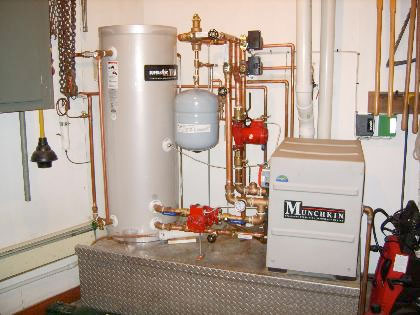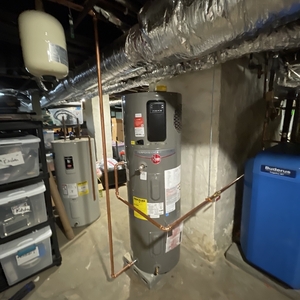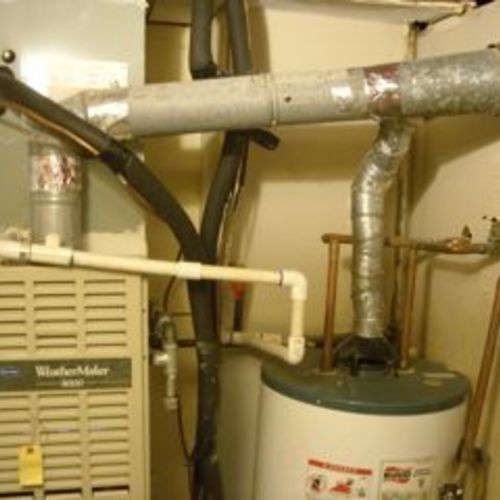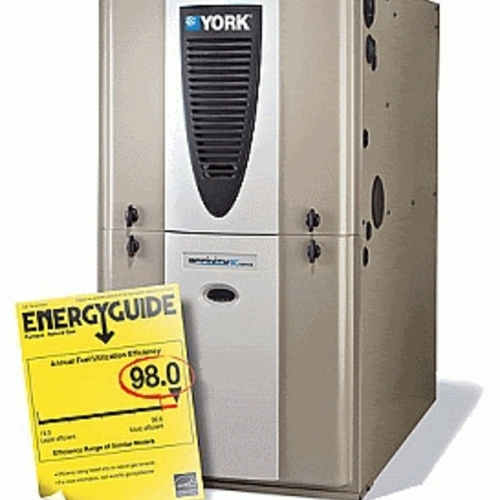
Image Credit: Munchkin Boiler & Indirect Water Heater
Continuing our series on water heating, this week we’ll look at two options for heating water with the home’s central boiler. First some terminology: boilers heat water or produce steam for distribution in baseboard units or steam radiators, while furnaces heat air for distribution through ducts and registers. Integrating water heating with a standard hot-air furnace is not possible; if you have a furnace, you have to stick with a stand-alone water heater.
There’s a lot of appeal to the idea of using your boiler to also heat water. You can get by with just one burner for both heat and hot water, so there’s less to maintain or to go wrong, and when you’re heating the house anyway, it doesn’t take all that much extra energy to heat water also.
There are two common options for using a home’s boiler for water heating. The most common is referred to as a “tankless coil.” This is a relatively small heat exchanger that fits into a gas- or oil-fired boiler. These are popular for people with hot-water baseboard heat because they’re inexpensive options or retrofits for standard boilers. A copper-coil heat exchanger extends into the boiler, and water is heated as it flows through this coil. It is very much like the “tankless water heater” described last week, except that the heat source is your boiler.
The problem with tankless-coil water heaters is that the boiler has to be hot to produce hot water. In the winter in a cold climate, the boiler is hot much of the time and may not even need to fire up to supply hot water (due to residual heat in the boiler). But during the summer the boiler is less likely to be hot, and the on-off cycling to heat water wastes a lot of energy. It is not unusual for water heating using an oil-fired boiler and tankless coil to use 200 to 300 gallons of oil during the summer months, and the average efficiency during that period may be as low as 25%. Thus, tankless-coil water heaters can make sense in the winter months, but they aren’t a good idea in summer.
The other primary option for using a heating system to produce hot water is to install an “indirect” or “indirect-fired” water heater. This is a separate insulated water tank that is heated using hot water from the gas- or oil-fired boiler. The indirect tank is usually plumbed to be a separate “zone” on the heating system. One advantage of this option is that during the warmer months the boiler only has to fire up occasionally to heat water in the indirect tank. Because water in the tank remains “thermally stratified” (with the hot water at the top, where it is drawn off to supply your shower or dishwasher), you can draw hot water from the tank multiple times before the boiler turns on to heat water in the tank.
Another plus is that because there is no burner on the storage tank, you can wrap it with extra insulation without having to worry about an air supply or venting (as you do with a gas-fired, storage-type water heater).
The downside to indirect water heaters is the cost. A good one will likely cost over $1,000, including installation of the additional zone on the heating system. This is much more expensive than a tankless coil or a conventional gas or electric storage-type water heater.
Interestingly, both kinds of integrated water heaters can help to keep your boiler in good working order. If your boiler is in a basement that stays fairly damp during the summer months, having it fire periodically—as will occur with either a tankless-coil or indirect water heater—is recommended by many heating contractors as a way to minimize corrosion. That was one of the reasons we put in an indirect water heater when we installed a Buderus boiler at our home ten or twelve years ago. Otherwise, I would likely have stuck with the stand-alone electric water heater that we had operated using off-peak electricity prior to installing a central heating system (more on off-peak electric water heating in a future column).
Some people choose to use a tankless-coil water heater during the winter months and then switch over to a stand-alone electric or gas-fired water heater during the summer. Except for possible boiler corrosion problems in damp basements, this can be a good compromise. Ask your heating contractor or plumber for advice on these different options for your particular situation.
Weekly Newsletter
Get building science and energy efficiency advice, plus special offers, in your inbox.















13 Comments
How common are tankless coils?
When I worked in a plumbing supply house in the late 1970s, there were still a lot of tankless coils around. But they have been fading away fast since then. I don't think it's true any longer that tankless coils are the most common option for using a home's boiler for water heating. Indirect water heaters are now far more common.
Using water heaters as space heat source?
I'm wondering what experience you and your staff have with the opposite idea: using a typical water heater to also supply space heat (especially in buildings with very low heat load).
It's been done for years
John,
People have been using ordinary water heaters to provide space heating for years. Of course, most conventional gas water heaters are relatively inefficient. But they're cheap and readily available. If your house is very well insulated, you don't need much heat. It's possible to run a hydronic loop off a water heater -- running the loop to baseboard radiators (which require relatively hot water) or in-floor radiant loops (which require cooler water). It's also possible to insert a hydronic coil in an air handler.
I've been considering this
I've been considering this option for a good while now and I've come to the conclusion that is the best thing to do. My Houston hvac contractor should also have a word to say on this, they have installed my heating system.
HVAC Contractor warend against this
I recently spoke with an HVAC Contractor who said there is no way an ordinary water heater can provide enough heat for hydronic radiant floor heating. They advised a gas boiler as the heat source. What about using a solar hot water system to provide heating for the hydronic radiant system?
Your HVAC contractor is wrong
Michael,
Your HVAC contractor is mistaken. An ordinary water heater is perfectly capable of heating a well insulated house, even in Minnesota or Vermont.
Water heater recommendation
Martin,
Thank you for your response. I was hoping you would say that. I am not an expert, but I'd like to learn as much as I can before deciding what the best heating options are for my home. We are designing "a well-insulated house" and would love to add radiant floor heating (mostly for IAQ and comfort reasons). I'm concerned that a boiler in a well-insulated, passive solar home might be overkill. I'd love to think my hot water system could provide sufficient heating for both the radiant floor system and our domestic needs. In this scenario, what type of water heating equipment do you recommend? We've been looking close at a solar thermal system with some backup solution.
No simple answer
Michael,
There is no single answer to the question, "what's the best type of water heating equipment?"
To help you answer the question, though, here's some good information to get you started:
https://www.greenbuildingadvisor.com/green-basics/water-heating
Can I use an indirect hot water tank with boiler
I am trying to cut the propane consumption of my closed loop radiant heat system, which consists of a stand alone boiler and 4 zones for a 5000 sqft home. However, the system uses too much propane. I heard that a way to save fuel consumption by almost 50% is to connect a 50 gal. indirect hot water tank into the closed loop system, so that the zones draw their heat from the liquid glycol coils in the indirect hot water tank, and then the hot water tank subsquently draws its heat from the boiler. Will this work? If so, will a 50 gallon water heater be sufficient in size? And lastly, can the hot water heater also be used to supply domestic hot water?
Response to Rick
Rick,
You have been misinformed. There is no way that adding a water-storage tank to a closed-loop radiant floor heating system will cut your heating fuel consumption by 50%. A BTU is a BTU, and adding a tank is not magic.
Using a dedicated boiler to supply heat is usually your best option, from an efficiency perspective.
I'm sorry to hear that your boiler burns propane. Propane is an expensive fuel compared to fuel oil: not only does it almost always cost more per gallon, but it provides far fewer BTUs per gallon -- a double whammy that hits you in the pocketbook.
Your best bets for lowering your fuel bills are simple weatherization measures: reducing air leaks in your home's envelope and beefing up insulation levels.
Hybrid water heaters
The fact that these hybrid water heaters draw heat from heated space raises a little red flag to me. I haven't seen any report yet that shows the cost of the heat that's pumped into the water from the local space (e.g., heated basement). If I put one of these in my attic here in San Antonio, it would draw heat from the almost-always-hot attic air, which is heated by the sun. I wonder how that would compare with a solar panel on the roof, when the lifetime cost is calculated.
http://www.trackcompare.co.uk/commercial-vehicle-tracking
Hybrid water heaters
If by "hybrid water heaters" you're referring to heat-pump water heaters, those are covered elsewhere in GBA, including here: https://www.greenbuildingadvisor.com/blogs/dept/energy-solutions/heat-pump-water-heaters. Yes, they do rob heat from the surrounding air in the winter (and deliver free cooling in summer).
hot water heater for space heating
I am living in Tucson with a modest heating requirement...we do get some below freezing overnight lows. I use a 50 gallon natural gas hot water heater combined with a First Co. (Dallas TX) air handler. My only problem is that my shower is marginally warm if the space heating has been running for longer than 10 minutes.....like at 5:30 or 6:00am on our coldest day. My solution is to manually shut off the heat and wait 3-5 minutes then shower. This happens no more than 2 or 3 times a winter. My house is 4300 square feet built of Liteform ICF and has a circulating domestic hot water supply. Great system, this is my second home using it. My maximum gas bill $125 in Jan or Feb.
Log in or create an account to post a comment.
Sign up Log in